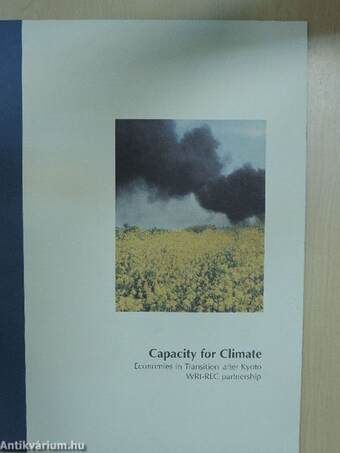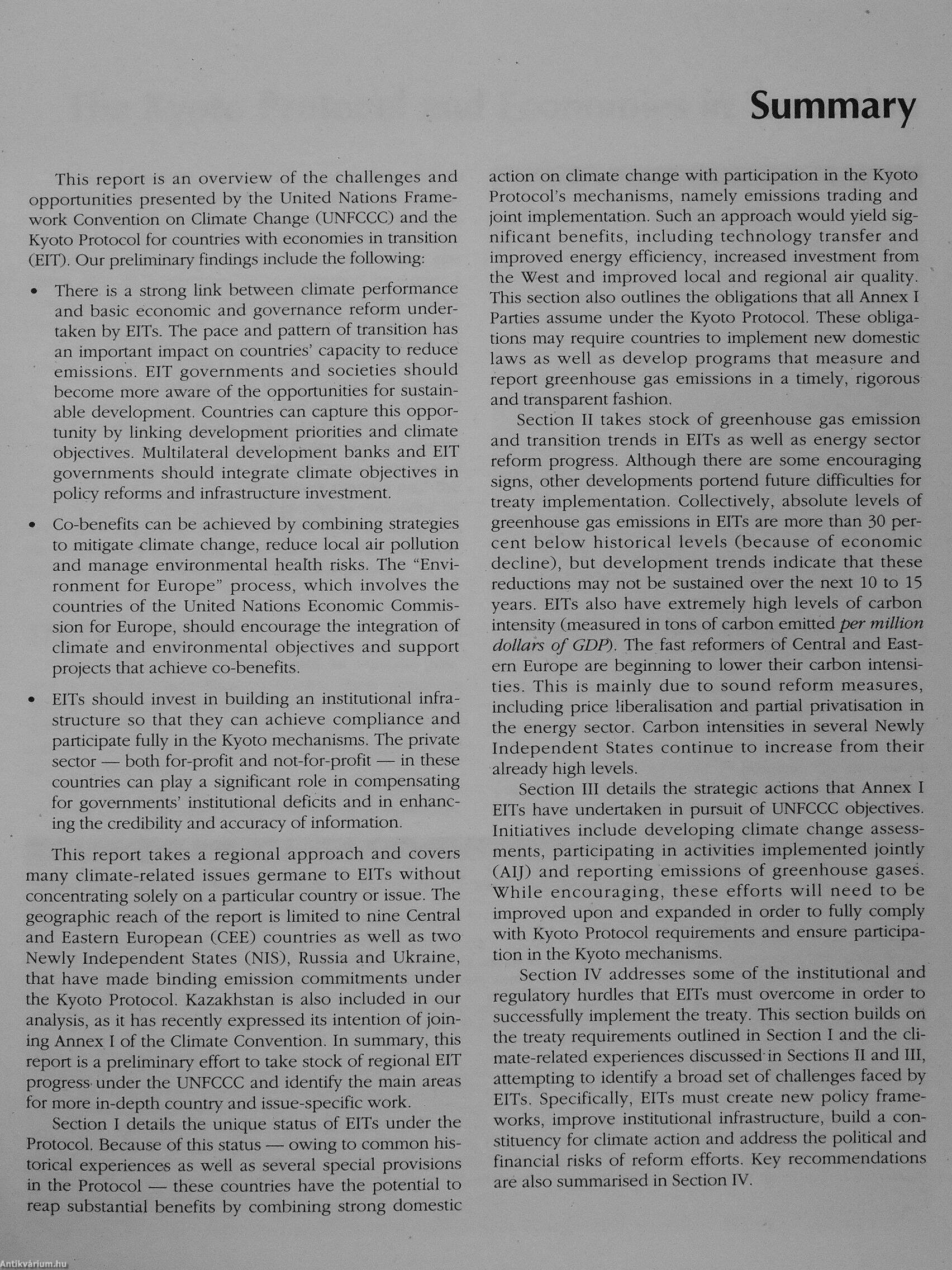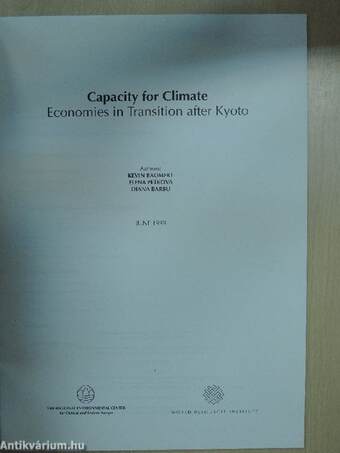1.116.661
kiadvánnyal nyújtjuk Magyarország legnagyobb antikvár könyv-kínálatát
Capacity for Climate
Economies in Transition after Kyoto
| Kiadó: | The Regional Environmental Center for Central and Eastern Europe |
|---|---|
| Kiadás helye: | Szentendre |
| Kiadás éve: | |
| Kötés típusa: | Tűzött kötés |
| Oldalszám: | 27 oldal |
| Sorozatcím: | |
| Kötetszám: | |
| Nyelv: | Angol |
| Méret: | 30 cm x 21 cm |
| ISBN: | 963-8454-65-2 |
naponta értesítjük a beérkező friss
kiadványokról
naponta értesítjük a beérkező friss
kiadványokról
Előszó
TovábbFülszöveg
THE RÉGIÓNÁL ENVIRONMENTAL CENTER FOR CENTRAL AND EASTERN EUROPE (REC) is a non-partisan, nonadvocacy, not-for-profit organisation with a mission to assist in solving environmental problems in Central and Eastern Europe (CEE). The Center fulfils this mission by encouraging cooperation among non-governmental organisations, governments, businesses and other environmental stakeholders, by supporting the free exchange of information and by promoting public participation in environmental decision-making. The REC was established in 1990 by the United States, the European Commission and Hungary. Today, the REC is legally based on a Charter signed by the governments of 25 countries and the European Commission, and on an International Agreement with the Government of Hungary. The REC has its headquarters in Szentendre, Hungary, and local offices in each of its 15 beneficiary CEE countries which are: Albania, Bosnia and Herzegovina, Bulgária, Croatia, Czech Republic, Estonia, Hungary, Latvia,... TovábbFülszöveg
THE RÉGIÓNÁL ENVIRONMENTAL CENTER FOR CENTRAL AND EASTERN EUROPE (REC) is a non-partisan, nonadvocacy, not-for-profit organisation with a mission to assist in solving environmental problems in Central and Eastern Europe (CEE). The Center fulfils this mission by encouraging cooperation among non-governmental organisations, governments, businesses and other environmental stakeholders, by supporting the free exchange of information and by promoting public participation in environmental decision-making. The REC was established in 1990 by the United States, the European Commission and Hungary. Today, the REC is legally based on a Charter signed by the governments of 25 countries and the European Commission, and on an International Agreement with the Government of Hungary. The REC has its headquarters in Szentendre, Hungary, and local offices in each of its 15 beneficiary CEE countries which are: Albania, Bosnia and Herzegovina, Bulgária, Croatia, Czech Republic, Estonia, Hungary, Latvia, Lithuania, FYR Macedónia, Poland, Romania, Slovakia, Slovenia and Yugoslavia. Recent donors are the European Commission and the governments of the United States, Japan, Austria, Canada, Czech Republic, Croalia, Denmark, Finland, Francé, Germany, Hungary, the Netherlands, Norway, Slovakia, Switzerland and the United Kingdom, as well as other inter-governmental and priváté institutions. THE WORLD RESOURCES INSTITUTE (WRI) is an independent center for policy research and technical assistance on global environmental and development issues. WRI's mission is to move humán society to live in ways that protect Earth's environment and its capacity to provide for the needs and aspirations of current and future generations. Because people are inspired by ideas, empowered by knowledge and moved to change by greater understanding, the Institute provides - and helps other institutions provide - objective information and practical proposals for policy and institutional change that will foster environmentally sound, socially equitable development. WRI's particular concerns are with globally significant environmental problems and their interaction with economic development and social equity at all levels. The Institute's current areas of work include economics, forests, biodiversity, climate change, energy, sustainable agriculture, resource and environmental information, trade, technology, national strategies for environmental and resource management, business liaison, and humán health. In all of its policy research and work with institutions, WRI tries to build bridges between ideas and action, meshing the insights of scientific research, economic and institutional analyses and practical experience with the need for open and participatory decision-making. WRI-REC PARTNERSHIP The Régiónál Environmental Center for Central and Eastern Europe and the World Resources Institute have förmed a partnership to assist Central and Eastern Europe and the New Independent States in reforming their policies and institutions to comply with commitments and respond to opportunities for infrastructure development created by ihe Framework Convention on Climate Change and the Kyoto Protocol. VisszaTémakörök
- Idegennyelv > Idegennyelvű könyvek > Angol > Természettudományok > Biológia
- Idegennyelv > Idegennyelvű könyvek > Angol > Természettudományok > Földrajz
- Természettudomány > Földrajz > Általános természeti földrajz > Légkör
- Természettudomány > Földrajz > Általános természeti földrajz > Meteorológia
- Természettudomány > Földrajz > Kontinensek földrajza > Téma szerint > Éghajlat
- Természettudomány > Földrajz > Idegen nyelv > Angol
- Természettudomány > Biológia > Ökológia, környezetvédelem > Környezetvédelem > Környezetgazdálkodás
- Természettudomány > Biológia > Ökológia, környezetvédelem > Idegennyelvű











